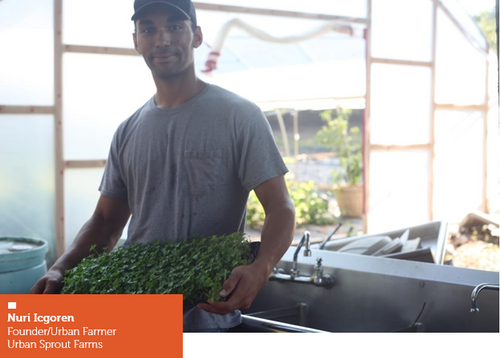
Generating a Robust Local Food Economy
A sustainable local food economy is driven by healthy production on thriving farms and markets that provide equitable access to affordable, fresh, locally grown food.
Click an icon to see a snapshot of how Metro Atlanta’s local food businesses are creating economic value.


According to United States Department of Agriculture, for every $100 spent on locally produced food at a farmer’s market, $62 stay within our local economy, and $99 stay in the state.
Fresh Harvest is a subscription food delivery service making it quick and easy for families in Atlanta to get fresh, sustainably grown produce from local farms. Through partnerships with 24 Georgia-based organic farmers and food suppliers, the Clarkston-based Fresh Harvest delivers baskets filled with produce and artisan items every week to homes and businesses in the Metro Atlanta area.

Since its launch in 2012, Fresh Harvest’s mission has been supporting local farmers by making healthy eating convenient and automated for its customers. Co-founder Zac Harrison adds, “We want to support our city and have the food that’s grown here, stay here.”
In 2016, Fresh Harvest purchased $685,000 in food from local farmers and artisans and prides itself on its “responsive supply chain,” sourcing from local farmers based on their seasonal availability. The company also recently started sourcing from its own Fresh Harvest Garden, which sold 1,074 pounds of produce in 2016, including diverse foods such as Ethiopian kale and New Zealand spinach. The garden serves as a community gathering space for dinners and cooking demonstrations and will expand production from an eighth of an acre to two acres in 2017, thanks to a grant from the Food Well Alliance.
Fresh Harvest was founded not only to be a profitable business, but also to provide community employment. The company plans to grow its 18-member staff, of whom nine are from Clarkston’s refugee community.
Hiring local refugees is foundational to Fresh Harvest’s social enterprise approach. Refugee employees contribute agricultural skills to the garden. They also help manage a new farmers market for residents at the Willow Branch Apartments in Clarkston. One of the things that excites Harrison the most about Fresh Harvest is its role in the local food system. Farmers are saying, “How much can we grow for you guys? Is there anything we could grow that would be better for your customers?” To Harrison that means “the buying power of the Fresh Harvest customer can influence what local farmers are growing.” It also means that Fresh Harvest is successfully cultivating the supply and demand of local food.



Food Well Alliance wants to hear from urban farmers, local food entrepreneurs and distributors about challenges and opportunities to scale and increase access to locally grown food.
Here is what we have heard from the community so far:
What are your ideas for removing these barriers?
• Lack of political will to expand urban agriculture as one of the tools to increase local food access.
• Lack of access to food within one mile of residence, especially affordable fresh and healthy foods.
• High real estate costs for farm land and food businesses.
• Lack of adequate post-harvest handling resources such as cold storage, processing facilities, customer sourcing, market expansion.
• The cost of living in Metro Atlanta, is challenging for low-earning farms and food businesses.
• Insufficient supply of affordable, local compost for urban farmers.
Imagine if we worked together to make this happen in Metro Atlanta:
• A local food economic development zone co-locating food businesses to foster business growth with technology and infrastructure and to drive greater efficiencies and profitability.
• Property tax incentives for local farming and food businesses helping to create jobs.
• Long-term leases or sale of vacant land to urban farmers and market gardens adding value to neighborhoods.
•Wide adoption of local food procurement policy by public and private institutions helping farmers diversify their markets and increase off-season sales.